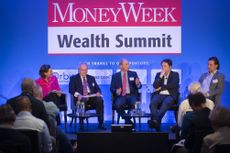Peter Spiller: how to not lose money to inflation and financial repression
Merryn talks to Peter Spiller of the Capital Gearing Trust about how he navigated the last extraordinary year; what he's buying now; and how he plans to ensure his wealth won't be eroded by inflation or financial repression.
Transcript
Merryn Somerset Webb: Hello, and welcome to the MoneyWeek Magazine Podcast. I am Merryn Somerset-Webb, editor in chief of the magazine and with me today is Peter Spiller, manager of the Capital Gearing Trust, he's been the manager since 1982, so we've got a lot of history to talk through there. Peter is also the founder of Capital Gearing Asset Management. Peter, thank you so much for joining us.
Peter Spiller: Thank you, Merryn.
MSW: Now, I wonder if we could just start -- I think an awful lot of the readers will know all about Capital Gearing, I think a lot of them will hold the trust -- but for those who don't, I wonder if you just give us a brief introduction to the to the business and the trust?
Subscribe to MoneyWeek
Subscribe to MoneyWeek today and get your first six magazine issues absolutely FREE

Sign up to Money Morning
Don't miss the latest investment and personal finances news, market analysis, plus money-saving tips with our free twice-daily newsletter
Don't miss the latest investment and personal finances news, market analysis, plus money-saving tips with our free twice-daily newsletter
PS: Well, we are a small business, which belongs to an employee ownership trust. So it's like the same structure as John Lewis. And that means that it will always belong to the employees going forward, over a long period. But it also means it's very unlikely to be taken over by a larger firm. And that for me provides tremendous stability in the management of the Trust.
The objective of the Trust is to provide a service to what one might think of as an archetypal client. So that client would have a long term investment horizon, and a total return mindset, a marked aversion to losing in the short term, losing money. But a desire to generate returns that at least match equity returns over the long term. So income is low.
There's no focus on income. But we have proved I hope over the years since 1982, in the last 39 years, we have had one down year, which was down 2%. And the share price is up 220 times over that period. So it's proved reasonably satisfactory in the past, and we hope we can continue in the same vein.
MSW: It sounds rather like a strategy that should suit practically every investor out there. I mean, who are the people who do not want to primarily protect their capital, and then as the secondary aim to grow it over the long term?
PS: Well, the distinction is that we emphasise growth as opposed to income. So the income return is pretty modest, it's about a half percent, the dividend will rise every year, I hope.
MSW: So what is the yield?
PS: It's about a half percent.
MSW: OK. So really not for people who want a simple dividend product, although, of course, if there's long term growth, you can sell shares, as you go, to produce, effectively, produce an income but not if what you want is regular dividend cheques.
PS: That's completely right. Although we've always taken the view that since the tax on capital gain for practically everybody is less than it is on income, then you might as well just sell what you want what you require to live on and produce the equivalent income.
MSW: I mean, I suppose often for people it's just about admin, having to think about that kind of stuff. So you've just said 39 years you've been managing this trust. And that takes us through an awful lot of ups and downs in the market. But I wonder if the last year has possibly been the most extraordinary you've witnessed in your career doing this.
PS: Well, it certainly has been, not least of course because, in broad terms, it was pretty difficult to predict the coronavirus, and so no amount of analysis in 2019 could have prepared you for it. But we were very lucky in that markets looked pretty frothy, at the end of 2019. And the price of renewable infrastructure in particular was very well bid, over the Christmas of 2019 and January 2020. And premiums got to very high levels, and we sold them all.
So as a result of that we went into the end of February, with a level of exposure to risk assets at 33%, which was concerning us. We were wondering, could we not find something better to do with the money. But we were lucky and plenty of opportunities opened up over the following month. And so we were able to put quite a lot of that money to work.
MSW: And what were the main opportunities that you saw there? And obviously, in retrospect, it's very easy to see what we should have all been doing in late March last year, but at the time, what is it that you did with the portfolio?
PS: Well, I completely agree with you that, at the time, it was not nearly so obvious as it now seems that the economy was going to bounce the way that it has and that the coronavirus would be time limited. And there was real concern that the economy would take a major downturn. Happily, the policy response around the world has been extremely positive. And that prevented that outcome from happening.
But the opportunities that were clear to us were, first of all, in some investment trusts, which went on to very large discounts. So for instance, Diverse Income went to 22%. River Mercantile went to 31%. These are both well run trusts with redemption features. And they were clearly absurdly cheap at that level. And I'll get on to another dozen trusts in a minute.
But the biggest move we made was into property, not retail and offices, but specialist property. And they were really of two sorts. One was a company like Tritax Big Box, which has warehouses let on long leases, average life is about 14 years, to very creditworthy companies. And essentially, the company looks like a credit portfolio. And its NAV was never in any serious doubt. But nevertheless, the shares sold off dramatically to under 90p at one stage. And so we were able to buy really quite a lot of that. So, 2% is normally our maximum position, and we had 2% in Tritax. Since then, of course, it's more or less doubled – well, it has doubled.
And then the other kind of property that was of interest was those companies which were clearly very badly hit by the coronavirus, but equally clearly would be as valuable after the virus as they were before. So student accommodation would be a classic example of that. No dividends – or very limited dividends for the time being –but we always thought that by the time you get to 2022, both the income and the dividends would be up to their previous levels. And we were again able to buy those on very big discounts to their to their NAV.
And finally, just coming back to Investment trusts, there were interesting situations like Pershing Square. So Pershing Square is a hedge fund run by Bill Ackman. He has a very good long term record. But actually, shortly after the issuance of Pershing Square into the London market and the Amsterdam market, he did have a very rocky patch, where he went short of a stock that went up a lot. And now he does not go short anymore. But despite having had that rocky patch, he actually had a very good asset performance in 2020, particularly through the crisis. But nevertheless, the shares went on to a 42% discount. And we again, added about 2% of the portfolio into that. Happily, that excellent performance, plus the fact that it was admitted to the FTSE 100 allowed us to sell down a large part of that position at 22% discount. So the combination of good asset performance and the reduction in discount from 42% to 22% produced very dramatic capital return.
MSW: Now, those discounts just don't exist anymore, do they in the main? Are you still holding, maybe not Pershing, but the property investments you made them?
PS: The property is still rerating, so DIGS, for instance– that’s GCP student accommodation – is still trading at a discount. But it's running very fast as we speak, as a matter of fact. I hope that won't be true for very long. And then we'll have to think again. Tritax actually now trades at a premium. And we no longer have 2% in that, we have sold it down to about 1% and actually are selling at the moment.
MSW: OK, so that brings us to what on earth one does today. So a year on, or more than a year on, everything looks expensive. It's hard to look at the market and say, well, anything – particularly in equities – is cheap on a valuation basis. But nonetheless, one has to put one's money somewhere. You don't want to bring cash because everyone's mildly worried about inflation, you don't want bonds, they don't look like the right place to be. So what on earth are you doing right now and likely to do over the next year? Big question!
PS: So, I should perhaps explain the principle of our asset allocation, which is that where prospective returns are good and risk is low, you want to lock in those returns for as long as possible, maximum duration.
So back in 82, when markets were remarkably cheap, balance sheets in excellent shape, and real interest rates were high, but falling, and inflation was also high but falling, so an ideal situation to to invest in. We wanted to maximise the duration. So we were 100% in equities at that stage, because equities have by far the longest duration of any asset class. And that worked extremely well.
If you fast forward to the late 90s. All our models were saying that equities were very richly priced and prospective returns exceptionally poor. But bonds still offered great, great returns, you'd get four and a half percent real. And we own bonds with proper durations, it's 30-year bonds and that sort of thing. Fast forward to today. Sorry, long answer to your question.
MSW: Long answer is good, it means I don't have to say anything at all. Keep going.
PS: So, the long-term outlook for equities is once again very cool, particularly for the S&P 500 it has to be said, and the long term return from nominal bonds, you just have to read it and read the yield off the page to see that they are negligible. And as you say, with inflation in the wings, that's a bit of a problem.
And so we think that the 60/40 split between equities and bonds, which has been working so well for lots of investors over the years, is a model that's broken. Because bonds, if they yield nothing to begin with, have no room to share capital appreciation to offset equity falls.
So we think the new version of that should be 60% equities and 40% index-linked bonds. Now, index-link bonds benefit from the fact that they have no such zero bound. In other words, negative yields can get quite big in conditions of financial repression. And as we'll get to, we think we will have conditions of financial repression.
So that's where we are at the moment. We have an asset allocation, we are currently just under half in risk assets, and about 30% in index-linked. We're 48%, more precisely, in risk assets, about 30% index-linked bonds, government bonds outside the UK.
MSW: Let's just go back to that before we move on. index-linked bonds, you say, outside the UK. Talk us through that.
PS: Why we have them outside the UK?
MSW: Yes.
PS: There's a push and a pull. So I think the medium-term prospects for selling are unexciting, but mildly, so that's the pull. The push is that the index-linked markets in the UK, the government index-linked markets in the UK, is massively distorted by pension funds trying to match their long term liabilities –they are told by their actuaries to match their liabilities, regardless of price. So to put it another way, they are paying a huge insurance premium for the rate of inflation being significantly higher than the markets are looking at now.
MSW: OK, so the price of index-linked bonds in the UK is very much distorted by regulation.
PS: Yes, exactly. Regulation always plays a big part in financial repression, because financial repression means that there is an elevated level of inflation. And interest rates are significantly below that level of inflation, ie, significantly negative real rates. And in the past, it's certainly been the case that in order to keep them there, regulators have forced various people typically, pension funds or insurance funds to own them. And that has kept the interest rates down, but with obviously very poor results for those holders.
But just to come back to the market. So I've said the values are very poor with the equity markets, but there is, of course, one overwhelming reason why they're performing as well as they are, and that is the growth of broad money.
In the United States, broad money is up 25% in the last year, an absolutely astonishing number. And there used to be a principle known as Marshallian K, which I haven't seen referred to for a long time. But it's very effective. And what Alfred Marshall came up with was the idea that if money growth was faster than the requirements of the economy demanded, than the growth in output and inflation demanded, then that excess money would go into assets. And that would push up the price of assets.
MSW: Seems to be working very well.
PS: And it seems to be working very well. The alarming thing is that there are real signs of froth. Say bitcoin, which we do not own on ESG grounds, but nevertheless, bitcoin for me is a real sign that markets are reaching stages of excess speculation.
MSW: Peter, is this a way of telling us that you did not participate in this week's Coinbase IPO?
PS: Do you know what? We completely failed to participate in that, which is not bad news, actually, because it fell 40% on its initial days trading, but...
MSW: Still worth 76 billion! Cryptocurrency's coming of age. That's what everyone keeps saying, this is this is the IPO that tells us that cryptocurrencies are here to stay.
PS: I might just correct you if I may. It is priced at 76 billion. In my view, it is very far from worth it.
Anyhow, signs of excess. So that suggests that we need to have some dry powder to take advantage of big falls, were they to happen. So our asset allocation is 48% of risk assets, 30% in index-linked and the balance of 22% is in what we call dry powder, which is Treasury bills, very short, high quality corporate papers and so forth. Actually, we sometimes use short UK index links to where we calculate that the nominal return will be higher than they are on short gilts.
In the long term, the biggest threat to the capital of investors in our view is inflation. And inflation is something that we think needs to happen. And we can see a route to happening. And we'll discuss when after that.
But first of all, the need, the overwhelming characteristic of the current world economy is excessive debt, you only have to read the IMF reports and so forth to see that that is the case. And debt is very bad news for growth. And it's also very bad news for fragility. And it is plainly vastly excessive relative to assets and income. And therefore, the only solution – actually, there are two solutions to excessive debt. One is it can be defaulted away, which generally involves a depression. And the other is that it's inflated away. And our observation is that democracies always choose the second.
MSW: Although of course, you could say that inflation is a kind of default, it's just that it's a default in real terms, isn't it?
PS: Yes, absolutely.
MSW: The person who lent you the money isn't getting back what they lent you, they're getting back something much diminished.
PS: Right. So the whole point of financial repression, I'm sorry to say as an investor, is that investors should get a very poor return, and need to devise strategies to maintain the real value of their money.
So another reason why, just on illustration, perhaps, of why inflation is important, is that if we look at the UK housing market, which currently trades at roughly an 8.2 times average earnings, and that's fine with interest rates where they are, but in any kind of normal interest-rate environment, that is unsustainable. And in order that there shouldn't be huge problems with negative equity and mortgage distress, it's clearly important that nominal house prices do not fall that much. And the only way that that can happen is that we have elevated levels of inflation.
MSW: Does that suggest that a really great thing to do right now, even at these prices, would be to buy residential property in the UK?
PS: Well, I think what it suggests is that you need to have real assets of one kind or another, as well as index-linked bonds, whether housing is a great way of expressing that is quite another matter, because of the elevated level, you're starting off there.
MSW: But if your debt is going to be inflated away, what difference?
PS: Yes, right. So I'm afraid I have always taken the view that housing should be – at least the first house that you have – it should be a matter of attending to where you need to live, how much you can afford. When it comes to other houses, other people's houses for rent, and that sort of thing. We actually do invest substantially in that.
We have a lot of investments in German residential, but we also own Granger in the UK, which is extremely attractive way of playing rental. So rental seems to be a much better way of playing it than ownership because rents are not going to come down the same way but should rise with nominal earnings so that they're not under the same pressure.
MSW: So it's a slightly safer way to do it.
PS: Yes, absolutely. We also own stocks like PRS which is developing houses for rent and provides a fantastic service. If you look at the dwellings that people are moving out of to go into their houses, for the same rent –essentially, the same rent – the improvement in the living standards is just wonderful to see.
And the other feature, just to give a plug to the sector, is that both Granger and PRS have been extraordinarily good over the difficulties in 2020, getting in touch with all their tenants, making sure they're OK, often providing some kinds of entertainments and that sort of thing. But more importantly, saying, if you're struggling, for goodness sake, let us know, we'll work it out together, you don't need to panic and leave. And it'll be alright.
MSW: Responsible capitalism in action. I like that.
PS: Yes. Which is just great. And actually in German resi, it's a very similar approach. We just had a very favourable outcome on Berlin rents, but where the rent freeze is held to be unconstitutional, Vinnovia have come out straight away. And so they're not collecting the back rent. If you were lucky enough to have had your rent frozen for the last year, that's fine. They will swallow that. So they're very constructive and helpful. I think that will be indeed helpful to them over the medium term, because housing is always political.
MSW: Well, everything's political... Let's go back to inflation. We can see why we might have inflation, but I think what we really want to know is when.
PS: Right, well, let's, let's talk about the routes to inflation. So what has kept inflation down over the last three or four decades has been a combination of demographics, vast increase in the working age population in the capitalist economy as a whole. Obviously, it was a huge increase when China joined the capitalist system, and also Eastern Europe, that has stopped and has turned around so the working age population is now falling relative to the number of dependents. So demographics works very slowly. But that wind is no longer a tailwind. It's a headwind.
The second huge influence has been globalisation, which is obviously related to that. And it is very clear that globalisation is reversing as the relationship between the West and China becomes more acerbic.
And the third big element has been technology, and technology continues. So technology definitely helps to keep prices falling.
But what we are seeing in the United States is the most extraordinary experiment in monetary and fiscal policy. And I think these developments can only be explained by two possible reasons. One is that it's just assumed that inflation is dead –it's been absent for so long as a problematic issue, it's just assumed that whatever happens, the modern structure of the economy, with the absence of strong unions and so forth, it just means that whatever the policy is, inflation will not revive.
The other, I should just note in parenthesis, is that maybe both Treasury secretary Yellen and the Federal Reserve actually understand that inflation needs to be very elevated. And so that taking risks with it is really not a problem. But whatever the reason, and actually there is evidence to support that in the adoption by the Fed have a an acronym called FAIT, which is sometimes referred to as Forget About Inflation Targets, but it actually means flexible average inflation targeting, but it's very clear that inflation will be tolerated significantly higher than the 2% target.
Anyhow, we've got this extraordinary stimulus. Third one we've just seen as $1.9trn – over 9% of GDP. And we are promised yet another one with an infrastructure programme, which is clearly modelled on the New Deal in the 30s, which is talked about as paid for by an increase in corporate taxes. But the expenditure over eight years; the corporate taxes – even if they have them – are over 15 years for the same amount. So it's clearly very stimulative over the next few years.
So now the knotty question of how much and when. And I think there are two ends. The lower end is indicated by what happened in the 1960s. Because inflation has always built very slowly. Each wave of inflation throughout history going back 1,000 years has always built slowly, and it's possible that this would be the same.
So if we go back to the 1960s, we had a period in the first half of the 60s when inflation was about one and a half, and there was a balanced budget. When Johnson came in, he had two very expensive programmes. The first was to help the poor, the so-called Great Society programme, which introduced Medicare and Medicaid and was expensive.
The other was the Vietnam War, which he inherited and which continued throughout his presidency. That war was so unpopular, that he did not feel able to raise taxes to pay for it. And therefore the fiscal deficit blew out, when I say blew out, it went from from zero to two and a half percent. So nothing like what we're contemplating now, but against the background of an economy that was already fully employed in 1965. That induced inflation, and it rose by about 1% a year, so that by the end of the 60s, it was trading at 6%.
Of course, it got much higher in the 70s. But this initial period, I think, is of interest now, because we are also coming out of a period of very low inflation. And part of the reason for that is that economists have come to understand that expectations play a very big role in inflation. A survey has just been published in the last couple of days, which shows for instance, that small businesses in America are finding it really difficult to get the labour they need, to get the number of employees they need, but they are very reluctant to pay up in wages, in higher wages, to achieve that recruitment, because they do not feel confident they can raise the price of their own products.
MSW: OK, so they're not ready for inflation. Don't believe in it yet.
PS: Right. That's a classic reason of why expectations play such a big role. And so it builds over time.
So the other end, if you wanted to be much more dramatic, is to look at monetary analysis. So as mentioned before, broad money has grown by 25% in the United States. So by definition, if velocity went back to what it was 15 months ago, then nominal GDP would rise by something similar. We're not, certainly not expecting that.
But I think the key is, for how long is that growth in broad money sustained? It will clearly come down. But with this kind of background and the banking system in fine fettle, it is likely to be much higher than is consistent with 2% inflation. So, we don't know the level, Merryn. And we don't know when.
MSW: Well, that does not answer any of my questions!
PS: Right, but in particular, with the when we're going to see, it seems likely a blip in inflation, as the economy emerges from restrictions both here and in America.
And the reason for that is that inventories are at record lows, we will get a spending of those forced savings that people have had to make – they couldn't get out and spend, and a tremendous appetite to actually go out and go to restaurants and pubs and whatever. So it seems likely that we will get a blip in inflation.
And certainly in the City as I can, I can tell you, when I go out to get my lunch, the cost of takeaway food is significantly higher than it was nine months ago. And there are other more intriguing bits, so dentists, for instance, the capacity of a dentist to treat patients is probably down 30 or 40% at a minimum.
MSW: Well, this is probably the case across all the service industries, isn't it. That their capacity has fallen significantly, thanks to all the various Covid regulations. So effectively, you've got the falling supply – or fallen supply – and, temporarily at least, very sharp rising demand at the same time. So we shouldn't be surprised to see over the next six or seven months at least a sharp rise in inflation. But then you would be likely to see it fall off and all the deflationists will go with the “I told you so, it's not real”.
PS: Yes, absolutely. I agree with all of that. And wages will be particularly interesting, because wages in the United States have been rising at a better than 5% rate in the last 12 months. And that's because of the compositional influence.
The people with the lowest pay have been those most likely to get laid off. And as they come back into the market, then we should see payback in the wages numbers. So the wages numbers will look quite depressed going forward. And as you say, that will encourage the view that inflation is just isn't a threat, because for long term inflation to develop wages just have to be a part of that equation.
So the signals are going to be very fuzzy. And we don't know whether in a year's time, there'll be a supply response. In other words, more restaurants will open and dentists will be allowed to see patients in succession as opposed to having to elaborately clean the establishment between each patient.
MSW: I would've thought that would happen quite quickly, actually. And everything I read about the transmission of the virus now suggests all this business – we've been worrying about touching things – has been fairly irrelevant. All we actually need to do is open the windows, because there's a common sense response. Dentists should be back to full capacity reasonably soon, just with slightly colder surgeries than they used to have.
PS: Right. I agree that that's what should happen. But actually there's tremendous evidence that the population as a whole has been very frightened and is very supportive of the caution expressed, notably by Imperial College. And that when we're all allowed in the middle of June to mix in restaurants, it looks like it's going to be a good chance that they'll still be required to have significant space between the table and that sort of thing.
MSW: And endless spraying of disinfectant.
PS: Yes. So who knows, this is all guesswork. In the medium term, of course, if you just take a two year view, then I'm sure that's correct, that they will be able to do that. So there might be a fallback in inflation, then who knows. But all I can say is that the monetary conditions are so stimulated, that I believe it's very likely that we will get significantly higher inflation. It may build as has been referenced in that earlier point about the Sixties, it may build quite slowly on one and a half percent a year. Or it may be much faster, which analysis would suggest. We frankly don't know.
MSW: OK, and we protect ourselves with, as discussed earlier, index-linked bonds, preferably US I think you said. And then should we also be holding large piles of gold?
PS: Not in our view. So we do have 2% in gold, short of 2% in gold, and it’s just worth discussing why that's the case. Why so little, given our views? The reason is that gold is supposed to trade at the same real price over time, it holds its real value over time. So, famously, I always recall being told earlier on in my career, the price of dinner at the Savoy had always cost the same amount of gold.
MSW: How much gold is that?
PS: I feel I don't have it in grammes. Because I'm afraid it's been disproved ever since because gold peaked at $850 in 1981, and then fell continuously, until what's generally known as the Gordon Brown low.
MSW: Poor Gordon Brown.
PS: Yes, it was bad luck wasn't it? It was $250 when he sold a lot of our gold. And it's rebounded enormously since. So whatever, whatever else it is, is not constant.
But more importantly than that, I think, is that the real price which is supposed to hold is calculable. We looked at what the price was in 1973, two years after Nixon closed the gold window. It was a pretty free market then, there was plenty of inflation around. I'm pretty sure that gold was not depressed at that time. And it was actually almost exactly $100 then, in 1973, and we applied the CPI in the United States to that, and you get a number, which is just under $600 per ounce. So it trades a very big premium to that.
Now, the circumstances where paying that premium might seem sensible are essentially where people think they might lose everything. So my favourite example would be something like instability in China, which might cause a lot of Chinese people to put maybe just 5% of their money into gold. And that would induce a very big price reaction indeed.
MSW: Interesting. So while, right now, in the past, you might have held gold as a hedge against inflation right now, you should probably be holding at least a small bet as a hedge against political crisis.
PS: Well, yes, because we're pretty convinced that TIPS [Treasury inflation-protected securities, ie, US index-linked bonds] are a much, much better protection against all moderate levels of inflation. So hyperinflation, gold has a role clearly. But against all foreseeable levels of inflation, we think Tips are much better protection.
And the other thing about Tips, which I should have mentioned much earlier, forgive me, is that they play a marvellous role in allowing us to pursue our first objective, which is not to lose money, because their performance is unhedged. Their performance, since Tips have been around, which is in the late 90s, has been powerfully negatively correlated with equity markets. So it provides tremendous stability to a portfolio.
That was very well illustrated in 2020, where they did really well when everything else was plunging in March. But actually have paid back, so negative correlation works both ways, of course. But nevertheless, you know, we think that's fine, a price we're prepared to pay, particularly since we think very significant capital gains are to be made in real terms if financial repression emerges in the way that we believe that it will.
MSW: Yes. We are getting quite close to the end of the time we can use Peter. But just before we end, I wanted to pick you up on something you said about halfway through our talk, we were talking about bitcoin, and you said that of course it is an ESG disaster. Is that based simply on its energy usage?
PS: Well, my partner Chris Clothier has written a very good paper which is available on our website about this but, very briefly, it is. So the energy consumed by bitcoin miners exceeds that consumed by Chile, I think its carbon footprint is greater than Hong Kong. Now it's true, of course, that everything that's produced uses energy of one kind or another, but the proportions here are just alarming, I believe.
MSW: It is also the case, I suppose one of the things we talk about a lot when we talk about cryptocurrencies at the magazine is that, we're told, for example by cryptocurrency bulls, that we don't need to worry about the energy used up in the creation of bitcoin because everything else uses up energy in its creation as well. There's a reasonable amount of energy used, for example, to take gold out of the ground.
But my slight problem with that is that when you've got the gold out, you've got the gold – there's no energy debt attached to it. But to keep your bitcoin going, you've got to, you've got a permanent infinite energy liability, because to keep it, keep it sitting around in the cloud, or wherever, and it requires energy. So it's a different type of thing.
And then we're told by our bullish cryptocurrency friends, that again that doesn't matter either. And it doesn't matter how much energy is used in the creation and the sustaining of your bitcoin position, because you've created a productive asset. And as long as it's productive enough, it doesn't matter how much energy was used to create it.
And that, again, rests on the assumption that bitcoin is somehow a productive asset. And I'm just guessing here for you to just guess that you don't think that bitcoin is a productive asset?
PS: Well you're obviously right. It doesn't fulfil any of the criteria that have characterised money in the past. It's clearly not a stable source or store of value. Its use in transactions is much exaggerated in my view, because of course, there are people who say that you can buy your insurance in Switzerland through bitcoin, that sort of thing. But the key is, what do they do with the bitcoin when they get it? The answer is they sell it immediately. So it's just, frankly, a fad.
MSW: It's just another middleman in that sense. You use your dollars to buy your bitcoin, you pay for something in bitcoin, and they immediately turn that bitcoin into dollars. What was the point?
PS: Yes, because all their costs are in dollars now. So it's not a stable unit of account, either. It's not a meaningful means of transaction. So it has none of the characteristics of money. But I have to tell you, that I'm probably the last person to ask about it. I've been following bitcoin reasonably closely, since it was $300. And as we speak, it's now $62,000.
MSW: We could all have retired by now. I have a tiny, tiny position in bitcoin and boy, oh, boy, do I wish it was bigger.
PS: Yes, well, indeed, well it is bigger.
MSW: I wish it has started bigger. And then you know, I too could have spent all of lockdown in Lamu.
PS: Yes, super.
MSW: Peter, I think we have to come to an end, the readers have got a treat because we have to offer slightly longer than usual so thank you very much for that. And I hope that we will speak again soon.
PS: Look forward to it. I hope in person.
MSW: Yes, me too. Thank you, everybody for listening. We really appreciate it.
More from us, of course, at moneyweek.com and if you would like to get our free morning newsletter brilliantly written –often by John, sometimes by Dominic Frisby who is a big cryptocurrency fan – you can get a signed up for that again at moneyweek.com.
And of course you can follow us on Twitter at @MoneyWeek. And you can follow me on twitter at @MerrynSW. And I will actually right now go find that paper that Peter's colleague has written on bitcoin and energy usage and tweet that out so you can all enjoy that as well. Thank you very much.
Oh, and by the way, do remember to review us if you would like to on your podcast platform of choice. Only leave good reviews. If you didn't enjoy the podcast, please don't mention it publicly. Thank you very much.
-
 Pension vs property: which option provides the best income for your retirement?
Pension vs property: which option provides the best income for your retirement?News With the cost of a comfortable retirement on the rise, future retirees need to weigh up which strategy offers the best returns. But is a pension a better bet than property?
By Henry Sandercock Published
-
 The industry at the heart of global technology
The industry at the heart of global technologyThe semiconductor industry powers key trends such as artificial intelligence, says Rupert Hargreaves
By Rupert Hargreaves Published
-
 Halifax: House price slump continues as prices slide for the sixth consecutive month
Halifax: House price slump continues as prices slide for the sixth consecutive monthUK house prices fell again in September as buyers returned, but the slowdown was not as fast as anticipated, latest Halifax data shows. Where are house prices falling the most?
By Kalpana Fitzpatrick Published
-
 Rents hit a record high - but is the opportunity for buy-to-let investors still strong?
Rents hit a record high - but is the opportunity for buy-to-let investors still strong?UK rent prices have hit a record high with the average hitting over £1,200 a month says Rightmove. Are there still opportunities in buy-to-let?
By Marc Shoffman Published
-
 Pension savers turn to gold investments
Pension savers turn to gold investmentsInvestors are racing to buy gold to protect their pensions from a stock market correction and high inflation, experts say
By Ruth Emery Published
-
 Where to find the best returns from student accommodation
Where to find the best returns from student accommodationStudent accommodation can be a lucrative investment if you know where to look.
By Marc Shoffman Published
-
 Best investing apps
Best investing appsWe round up the best investing apps. Looking for an easy-to-use app to help you start investing, keep track of your portfolio or make trades on the go?
By Ruth Emery Last updated
-
 The world’s best bargain stocks
The world’s best bargain stocksSearching for bargain stocks with Alec Cutler of the Orbis Global Balanced Fund, who tells Andrew Van Sickle which sectors are being overlooked.
By Andrew Van Sickle Published
-
 Revealed: the cheapest cities to own a home in Britain
Revealed: the cheapest cities to own a home in BritainNew research reveals the cheapest cities to own a home, taking account of mortgage payments, utility bills and council tax
By Ruth Emery Published
-
 UK recession: How to protect your portfolio
UK recession: How to protect your portfolioAs the UK recession is confirmed, we look at ways to protect your wealth.
By Henry Sandercock Last updated